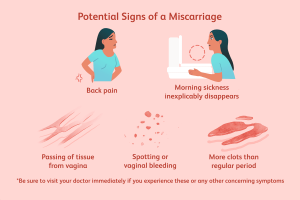Pregnancy is often a time of joy and anticipation, but for some, it can be marked by unexpected loss. Miscarriage, the loss of a pregnancy before 20 weeks’ gestation, affects 10-20% of known pregnancies. While it’s a topic many prefer not to dwell on, understanding the signs, causes, and what to do if it happens can be crucial for expectant parents.

Recognizing miscarriage symptoms
Dr. Korede Durojaiye, a leading obstetrician and gynecologist at National Hospital, Abuja explains, “Miscarriage can occur suddenly or gradually, making early symptoms sometimes difficult to detect.”
Key signs to watch for include:
• Vaginal bleeding or spotting (pink, red, or brown)
• Cramps or pain in the lower abdomen
• Passing tissue or blood clots
“It’s important to note,” Dr. Durojaiye adds, “that while most people experience cramps, a miscarriage isn’t always painful. The heaviest bleeding typically subsides within hours, but spotting can continue for up to three weeks.”
When miscarriage occurs: Most miscarriages happen during the first trimester (first 12 weeks of pregnancy). Dr. Chidi Esike from the Alex Ekwueme Federal University Teaching Hospital in Abakaliki notes, “If you’re not tracking your cycle, an early miscarriage might be mistaken for a period. After the first trimester, the risk drops significantly to around 3-4%.”
 Causes of miscarriage
Causes of miscarriage
Understanding that miscarriages often result from factors beyond one’s control is crucial. Dr. Esike outlines the primary causes:
• Chromosomal abnormalities: “About half of all miscarriages are due to random chromosomal issues in the fertilized egg,” he explains.
• Uterine or cervical problems: Conditions like endometriosis or cervical insufficiency can interfere with embryo development.
• Infections: Untreated sexually transmitted infections or certain food-borne illnesses can lead to miscarriage.
Dr. Bello Abubakar, a reproductive health specialist in Sokoto, adds, “Other risk factors include maternal age over 35, exposure to environmental toxins, certain health conditions, and lifestyle choices like smoking or alcohol consumption.”
What doesn’t cause miscarriage
It’s equally important to dispel myths. Dr. Abubakar clarifies, “Physical activity and sex have not been linked to miscarriage. However, if you’re unsure about any activity during pregnancy, consult your healthcare provider.”
Steps to take if you suspect a miscarriage
If you experience potential miscarriage symptoms, contact your healthcare provider immediately. They will want to confirm the miscarriage and ensure you’re not at risk for complications. Miscarriage often resolves on its own, but medical intervention may be necessary in some cases.
Recovery and self-care
Recovering from a miscarriage involves both physical and emotional healing. Dr. Esike recommends:
• Avoid placing anything in the vagina for two weeks to prevent infection
• Eat a diet rich in iron and vitamin C to support blood production
• Seek emotional support from family, friends, or a counselor
Dr. Abubakar emphasizes, “There’s no right or wrong way to feel after a miscarriage. It’s okay to take time to rest and recuperate.”
Preventing miscarriage: While not all miscarriages can be prevented, Dr. Korede Durojaiye suggests steps to minimize risk:
• Quit smoking, alcohol, and drug use
• Get tested for STIs before pregnancy
• Manage existing health conditions
• Maintain a balanced diet and regular exercise routine
He adds, “If you’re planning a pregnancy, consider a preconception appointment with your healthcare provider. They can review your medical history and offer personalized recommendations.”
Miscarriage, while common, remains a challenging experience for many. By understanding the signs, causes, and steps to take, expectant parents can feel more prepared and empowered.
Remember, most women who experience a miscarriage go on to have healthy pregnancies in the future. If you have concerns, don’t hesitate to reach out to your healthcare provider for guidance and support.


